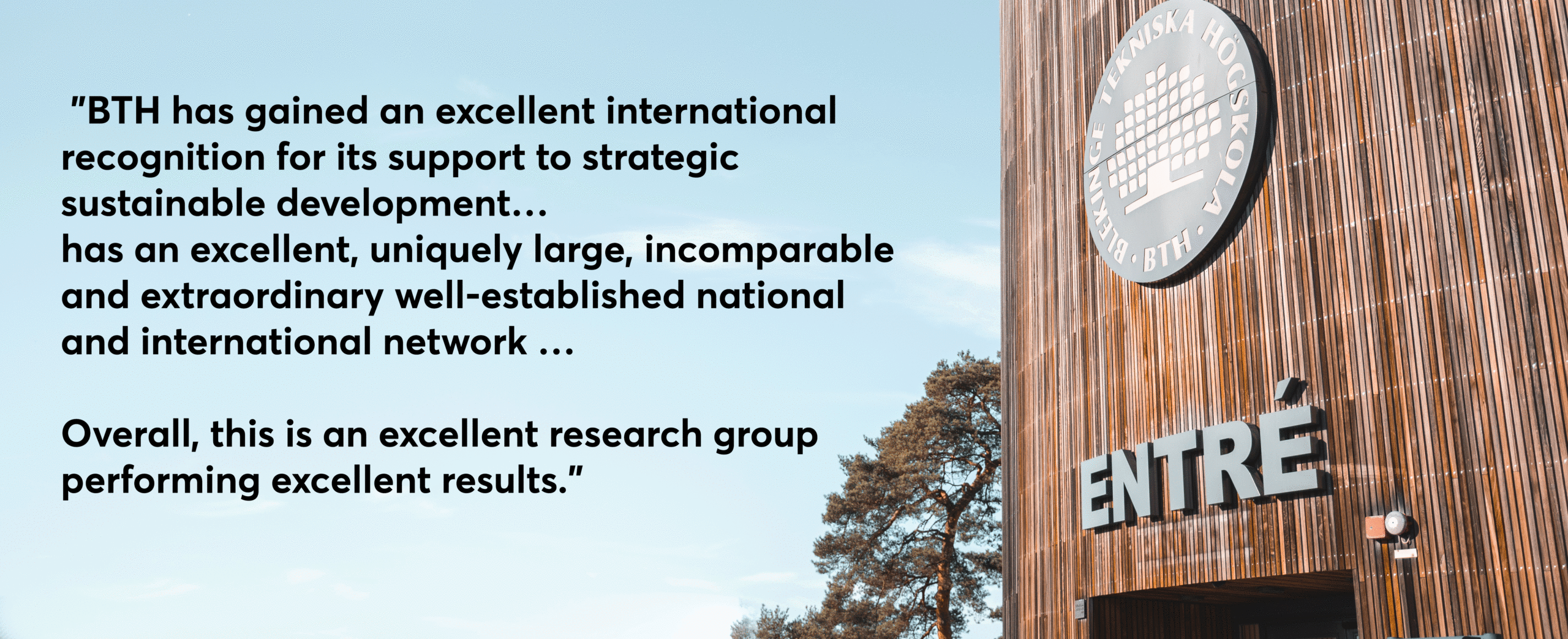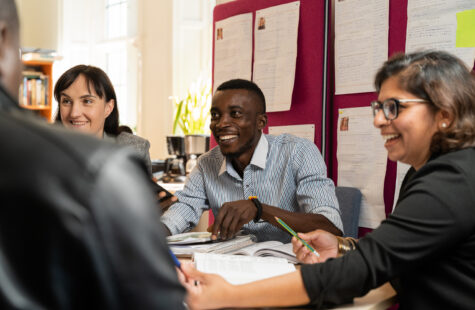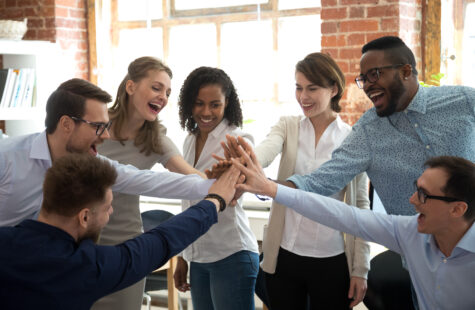Department of Strategic Sustainable Development
Department of Strategic Sustainable Development
 Our mission is to advance leadership and innovation for sustainability through collaborative scientific research and higher education. We develop methodological support and competence for organizations and individuals all over the world that want to create change for sustainability systemically, systematically and strategically.
Our mission is to advance leadership and innovation for sustainability through collaborative scientific research and higher education. We develop methodological support and competence for organizations and individuals all over the world that want to create change for sustainability systemically, systematically and strategically.
In our work, we collaborate intensively with partners in industry and society. All our research projects are conducted in collaboration with external partners and our students do many projects and other collaborations with companies, municipalities, and other organizations during their education.
We also carry out open lectures, seminars and workshops, and receive visits from the public, schools, politicians, ambassadors, and others who are attracted to and want to know more about our activities.
Below you can read about some of the exciting things we do in our research and education.
Research
Our research focuses on methodological support for companies, municipalities and other organizations that want to work strategically with sustainability; that is, organizations that want to contribute to society’s transition towards sustainability in a way that strengthens the organization.
Our research results are applied in industry and society world-wide and the research has been deemed excellent and internationally leading by many independent evaluators. For example, faculty of our department have received many prestigious awards, including the Blue Planet Prize (often referred to as the Sustainability Nobel Prize) and an independent external review of BTH research, including aspects such as publications, external funding, academic network and cooperation, networks in industry and society, international presence and visibility, and research environment, concluded in 2013 that:

We also had the honor to lead the development of a Special Volume of the Journal of Cleaner Production with a focus on Leadership towards Sustainability, and when it was finalized in 2017 the editor-in-chief and founder of the journal, Professor Donald Huisingh, deemed this to be:
“…the most outstanding special volume ever published in the journal.”
Furthermore, in a recent external evaluation of one of our big research projects, conducted by Damvad Analytics, our researchers were found to be highly cited. Three articles were found to be among the top one percent most cited in the world within their category.
We study, for example, definitions of sustainability and how organizations can consider sustainability aspects when they develop strategic plans, identify user needs, formulate product and service criteria, generate ideas and concepts, evaluate concepts, develop business models, procure, and communicate.
The aim is to provide support for strategic sustainability thinking early in innovation processes. It is in the early phases that the opportunities are the greatest to create solutions that contribute to the sustainable development of society and strengthen the organization. In these phases it is important to be able to model, simulate, and take into account, for example, the technical, business, economic, and socio-ecological consequences of different solutions in a coordinated way. Based on this, the organization can find the best options from a strategic sustainability perspective and develop these further in later phases of the innovation process.
We continuously develop a core methodology for strategic sustainable development further, currently with a specific focus on its definition of social sustainability. We also continuously use this core methodology to inform the development of more specific methodology in a number of application areas. Examples of current application areas are sustainable product- and service development, sustainable transport- and energy system development, sustainable food system development, and sustainable municipal- and regional development.
Education
We believe in education as a key piece of sustainable development and offer programs, courses and tailor-made business education based on cutting-edge research in education for sustainable development. Our educational offerings are informed by our world-class research and our education has been recognized with many excellent reviews from both the scientific sphere and from industry and society, for example:
“The year that changed my life. Words do not describe the power & impact of this Master´s program. People often ask me how I ended up working with what I do, and I always respond by saying that it was MSLS that provided me the clarity of the path ahead and the tools, skills and systems lens to take forward my talents into the world.”
-Sarah Forrester-Wilson, MSLS 2016
“I wish we had a program similar to MSLS here at MIT.”
– Otto Scharmer, Massachusetts Institute of Technology
“I am completely blown away by how much I am learning, the commitment and passion from everyone and how well structured everything is.”
– Victoria Karlsson, Sustainability Consultant, Sweden
Our flagship master´s programme is the Master’s in Strategic Leadership towards Sustainability (MSLS). The programme is a 10-month transformational masters programme in Karlskrona, Sweden that focuses on advancing students’ knowledge, skills, and global networks, in order to build their capacity to be strategic leaders in the co-creation of thriving, sustainable societies. Since its start in 2004, more than 800 students from 90+ countries and all continents of the world have taken the programme.
We also offer a wide range of both campus and online courses at Bachelor´s and Master´s level and we offer tailor-made training for companies and other organizations (so called Contract Training). For this, we specialize in application of strategic sustainable development and leading in complexity concepts to support organizations in developing the competence to navigate the challenges of today and the future. Please read more below on our offerings in these categories:
Ayers, James
- Department/Unit: Department of Strategic Sustainable Development
- Phone: +46 (0)455-385582
- Email: james.ayers@bth.se
- Workplace: Karlskrona
- Title: Lecturer
- Room: H451
Bergman, Dana
- Department/Unit: Department of Strategic Sustainable Development
- Phone: +46 (0)455-385542
- Email: dana.bergman@bth.se
- Workplace: Karlskrona
- Title: Lecturer
- Room: H415B
Broman, Göran
- Department/Unit: Department of Strategic Sustainable Development
- Phone: +46 (0)455-385504
- Email: goran.broman@bth.se
- Workplace: Karlskrona
- Title: Professor
- Room: H410A
Bryant, Jayne
- Department/Unit: Department of Strategic Sustainable Development
- Phone: +46 (0)455-385581
- Email: jayne.bryant@bth.se
- Workplace: Karlskrona
- Title: Lecturer
- Room: H450
Callaghan, Edith
- Department/Unit: Department of Strategic Sustainable Development
- Phone: +46 (0)455-385518
- Email: edith.callaghan@bth.se
- Workplace: Karlskrona
- Title: Senior lecturer
- Room: H415B
Johnson, Pierre
- Department/Unit: Department of Strategic Sustainable Development
- Phone: +46 (0)455-385536
- Email: pierre.johnson@bth.se
- Workplace: Karlskrona
- Title: Lecturer
- Room: H414B
Robèrt, Karl-Henrik
- Department/Unit: Department of Strategic Sustainable Development
- Email: karl-henrik.robert@bth.se
- Workplace: Karlskrona
- Title: Professor
- Room: H436
Thomson, Giles Redding
- Department/Unit: Department of Strategic Sustainable Development
- Phone: +46 (0)455-385716
- Email: giles.redding.thomson@bth.se
- Workplace: Karlskrona
- Title: Lektor
- Room: H453B


